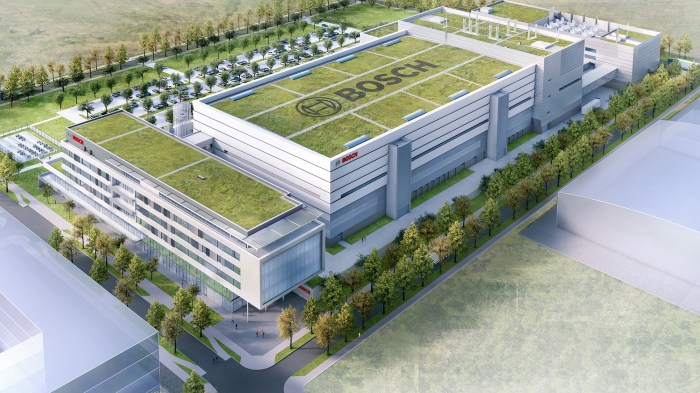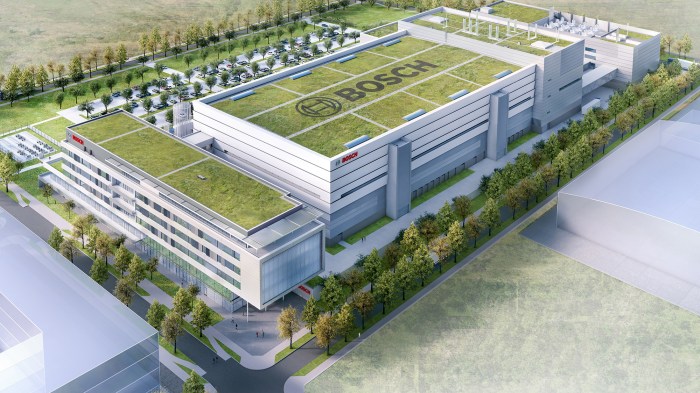Germany intel chip plant semiconductors – Germany Intel Chip Plant: Boosting Semiconductor Power – This move marks a significant shift in the global semiconductor landscape, as Intel, a leading player in the industry, sets up shop in Germany. This investment not only signals a commitment to European innovation but also has the potential to reshape the geopolitical balance of power in the tech world.
The new chip plant, strategically located in Magdeburg, is expected to be a major hub for advanced semiconductor manufacturing. It will contribute to Germany’s goal of becoming a leading player in the semiconductor industry, and the investment will have far-reaching implications for the European Union’s tech ambitions.
Intel’s Investment in Germany
Intel’s recent investment in a new chip plant in Germany marks a significant step in the company’s global expansion plans and underscores the growing importance of Europe in the semiconductor industry. This investment not only signifies Intel’s commitment to bolstering its manufacturing capabilities but also reflects its strategic focus on addressing the increasing demand for advanced chips, particularly in Europe.
The Intel Chip Plant in Magdeburg
The new chip plant, located in Magdeburg, Germany, is a major undertaking for Intel. With an estimated cost of €17 billion, the plant will be one of the largest semiconductor manufacturing facilities in Europe. The facility is expected to be operational by 2027 and will produce advanced chips using Intel’s latest manufacturing technology.
Strategic Significance for Intel
This investment is strategically significant for Intel for several reasons. Firstly, it allows Intel to expand its global manufacturing footprint and reduce its reliance on Asian suppliers. This diversification is crucial for Intel to mitigate supply chain risks and ensure a more stable and reliable source of chips.
Secondly, the investment positions Intel to capitalize on the growing demand for semiconductors in Europe. The European Union has set ambitious goals to increase its semiconductor production capacity and reduce its dependence on external suppliers. Intel’s investment aligns with these objectives and positions the company as a key player in the European semiconductor ecosystem.
Impact on the German Economy
The Intel chip plant in Magdeburg is expected to have a significant impact on the German economy. The project is estimated to create thousands of jobs, both directly and indirectly, across various sectors. The plant will also stimulate innovation and technological advancements in Germany, fostering a more robust and competitive semiconductor industry.
Furthermore, the investment will contribute to supply chain security and reduce Germany’s dependence on imported chips. This will strengthen Germany’s technological independence and enhance its resilience in the face of global economic and geopolitical challenges.
Geopolitical Implications
Intel’s investment in Germany carries significant geopolitical implications, particularly within the context of the ongoing US-China trade war and the global semiconductor shortage. This move has the potential to reshape the global semiconductor landscape, impacting not only the EU’s ambitions to become a leading player in the industry but also the broader geopolitical dynamics between the US, China, and the EU.
Impact on the EU’s Semiconductor Ambitions
The EU has been actively pursuing its own ambitions to become a major player in the semiconductor industry, recognizing the strategic importance of this sector. Intel’s investment in Germany provides a crucial boost to these efforts, as it strengthens the EU’s semiconductor manufacturing capabilities and attracts further investments in the sector.
Do not overlook explore the latest data about sustainable farming earth and space a must see at tnw conference.
This investment can help the EU achieve its goal of becoming more self-sufficient in semiconductor production, reducing its reliance on external suppliers, particularly from Asia.
Comparison of Geopolitical Strategies
The US, China, and the EU have adopted distinct geopolitical strategies in securing their semiconductor supply chains.
- The US has been actively promoting domestic semiconductor production through various incentives and subsidies, while also seeking to restrict exports of advanced chip-making technology to China.
- China, on the other hand, has been investing heavily in its domestic semiconductor industry to reduce its reliance on foreign suppliers. This includes supporting local companies and acquiring foreign technology through investments and partnerships.
- The EU, while seeking to reduce its reliance on external suppliers, has taken a more collaborative approach, aiming to strengthen its own semiconductor industry through partnerships and joint ventures with global players like Intel.
Impact on the US-China Trade War
Intel’s investment in Germany adds another layer to the complex US-China trade war. While the US seeks to limit China’s access to advanced semiconductor technology, Intel’s investment in Europe could potentially provide an alternative source of supply for European companies, reducing their reliance on US or Chinese chipmakers.
This could potentially weaken the US’s leverage in the trade war, as European companies may become less reliant on US-made chips.
Potential for Regional Cooperation
Intel’s investment in Germany could also foster greater regional cooperation within Europe. It could encourage other European countries to invest in their own semiconductor industries, leading to a more robust and diversified European semiconductor ecosystem. This, in turn, could contribute to a more resilient and less vulnerable European economy in the face of global disruptions.
Technological Advancements: Germany Intel Chip Plant Semiconductors

Intel’s new chip plant in Germany is not just about expanding production capacity; it’s a strategic move to push the boundaries of semiconductor technology. The company plans to implement cutting-edge processes and innovations, aiming to build a world-class facility that will drive advancements in chip design and manufacturing.
Advanced Manufacturing Processes
Intel’s German plant will leverage the company’s latest advancements in manufacturing processes, including:
- EUV Lithography:This technology uses extreme ultraviolet light to etch intricate patterns onto silicon wafers, enabling the creation of smaller and more powerful transistors. Intel’s German plant will be equipped with the most advanced EUV lithography machines, allowing for the production of chips with smaller feature sizes, leading to increased performance and efficiency.
- High-Density Packaging:This technology allows for the integration of more components within a smaller space, leading to increased functionality and reduced power consumption. Intel’s German plant will employ advanced packaging techniques, including 3D stacking and wafer-level packaging, to create chips with higher densities and performance.
- Advanced Materials:Intel is investing in research and development of new materials that can enhance the performance and reliability of semiconductor devices. The German plant will benefit from these advancements, potentially utilizing materials like advanced dielectrics and metal alloys for improved chip performance and efficiency.
Impact on Semiconductor Technology, Germany intel chip plant semiconductors
These technological advancements will have a significant impact on the future of semiconductor technology and its applications:
- Smaller and More Powerful Chips:Intel’s German plant will produce chips with smaller feature sizes, enabling the creation of more powerful and energy-efficient devices. This will lead to advancements in computing power, artificial intelligence, and other fields.
- Enhanced Connectivity:The plant’s focus on advanced packaging will contribute to the development of more compact and powerful chips, enabling faster and more reliable data transfer and communication capabilities.
- New Applications:The technological advancements implemented in the German plant will pave the way for the development of new applications and devices that were previously not possible, pushing the boundaries of what semiconductor technology can achieve.
Comparison with Other Semiconductor Facilities
Intel’s German plant is poised to be one of the most technologically advanced semiconductor facilities in the world. The plant’s focus on EUV lithography, advanced packaging, and new materials will place it at the forefront of the industry, competing with other leading semiconductor manufacturers like TSMC and Samsung.
“Intel’s investment in Germany is a clear signal of its commitment to technological leadership in the semiconductor industry. The new plant will be a hub for innovation, attracting talent and driving advancements in chip design and manufacturing.”Dr. Pat Gelsinger, Intel CEO
Economic and Social Impacts
Intel’s investment in Germany is expected to have significant economic and social impacts, creating new jobs, boosting economic growth, and fostering technological innovation. This investment also presents challenges, such as the need for a skilled workforce, infrastructure development, and environmental sustainability.
Economic Impacts
The economic impact of Intel’s investment in Germany is expected to be substantial. The construction of the new chip factory will create thousands of jobs during the construction phase and generate additional employment opportunities in related industries, such as logistics, manufacturing, and services.
The factory’s operation is projected to create thousands of permanent jobs, contributing significantly to Germany’s employment landscape. Moreover, the investment is expected to attract further investments in the semiconductor industry, creating a ripple effect across the German economy.
Social Impacts
Intel’s investment is anticipated to have a positive impact on the social fabric of Germany. The creation of new jobs will contribute to economic prosperity and social well-being, particularly in the regions where the factory is located. The investment will also stimulate technological innovation, leading to the development of new products and services that can benefit society.
Challenges and Opportunities
While Intel’s investment presents significant opportunities, it also poses challenges. The availability of skilled labor is a critical concern, as the semiconductor industry requires a highly specialized workforce. Germany will need to invest in education and training programs to ensure a sufficient supply of skilled workers.
Infrastructure development, including energy supply and transportation networks, is another key challenge. The government will need to work with Intel to ensure that the necessary infrastructure is in place to support the factory’s operations. Environmental sustainability is also a crucial consideration.
Intel will need to implement measures to minimize its environmental footprint, such as reducing energy consumption and emissions.
Expected Economic and Social Impacts
| Impact | Expected Outcome |
|---|---|
| Job Creation | Thousands of jobs created during construction and operation |
| GDP Growth | Significant contribution to German GDP through direct and indirect economic activity |
| Technological Advancements | Boost to German technological innovation and competitiveness in the semiconductor industry |
Future Prospects
Intel’s investment in Germany signifies a pivotal moment for the country’s semiconductor industry. It has the potential to reshape the industry landscape, creating new opportunities and challenges for the future.
Potential Future Prospects
The German semiconductor industry is poised for significant growth in the coming years, driven by Intel’s investment and other factors. The industry’s future prospects are promising, with potential for increased competitiveness, technological innovation, and economic growth. Intel’s investment is expected to attract other technology companies to Germany, creating a thriving ecosystem for innovation and development.
This could lead to the creation of new jobs, attracting skilled talent, and fostering a culture of innovation in the country. Additionally, the government’s commitment to supporting the semiconductor industry, through initiatives like the “Chips Act,” will further bolster the industry’s growth.





